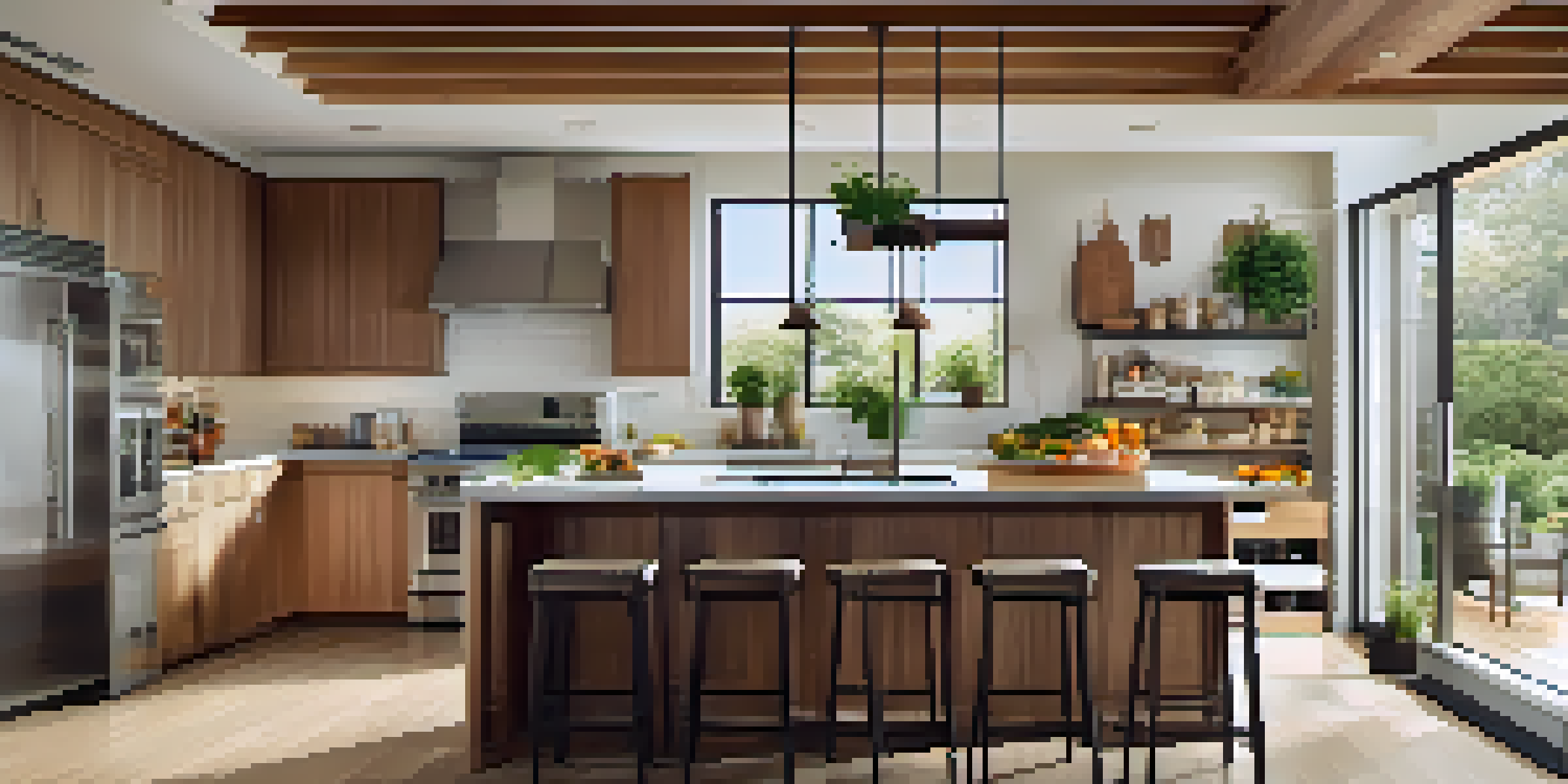Evaluating Your Home’s Value Post-Renovation

Understanding the Impact of Renovations on Home Value
Renovations can significantly boost your home's value, but not all improvements yield the same return. Major upgrades like kitchen remodels or bathroom additions often provide the best return on investment. However, it's essential to consider the current market trends and buyer preferences in your area.
Renovation can be a good investment, but it is important to keep your neighborhood in mind.
For instance, if you live in a neighborhood where modern kitchens are in demand, investing in a high-quality remodel can pay off handsomely. On the other hand, if your renovation doesn't align with local tastes, it may not increase your home’s worth as expected. Always research what features are sought after by potential buyers in your region.
Ultimately, understanding how renovations affect value helps you make informed decisions about which projects to undertake. Remember, it's not just about aesthetics; it's about enhancing functionality and aligning with market expectations.
Key Factors That Influence Home Value After Renovations
When evaluating your home's value post-renovation, several factors come into play. Location is paramount; homes in desirable areas often see higher value increases than those in less sought-after neighborhoods. Additionally, the quality of the renovations and how well they integrate with the existing structure can make a significant difference.

Another critical aspect is the overall market conditions. If your area is experiencing a seller's market, you may find that your home's value has increased more than expected. Conversely, in a buyer's market, the impact of renovations might be less pronounced, regardless of the quality of the work done.
Lastly, consider the square footage and functionality of your home. Expanding livable space, such as adding a deck or finishing a basement, can elevate your home’s appeal and value significantly.
Conducting a Comparative Market Analysis (CMA)
A Comparative Market Analysis (CMA) is a vital tool for understanding your home's value after renovations. This process involves comparing your home to similar properties in your area that have recently sold, focusing on features, size, and condition. By examining these comparable homes, you can gauge where your property stands in the current market.
The best way to increase your home's value is to make it feel like home to potential buyers.
To conduct a CMA, gather data on homes similar to yours in terms of location, size, and upgrades. Online real estate platforms or local realtors can provide valuable insights and help you compile this information. Look for homes that have sold in the past six months to get the most accurate snapshot of market conditions.
By analyzing these comparable sales, you can set a realistic price for your home, taking into account the renovations you've completed. This step is crucial in ensuring you're not undervaluing or overpricing your property.
Getting a Professional Appraisal for Accurate Valuation
While a CMA can provide a good estimate, hiring a professional appraiser can give you a more accurate valuation of your home post-renovation. Appraisers are trained to assess properties based on a variety of factors, including recent sales data, renovations, and overall market conditions. Their expertise can help you understand the true value of your investment.
During the appraisal process, the appraiser will conduct a thorough inspection of your home, taking note of the renovations and their quality. They will compare your property to similar homes in the area and consider the current market trends to provide a comprehensive valuation.
Investing in an appraisal can also be beneficial if you're considering selling your home or refinancing. Understanding its value will empower you to make informed decisions about your next steps.
Utilizing Online Valuation Tools for Quick Estimates
In addition to a CMA and professional appraisal, online valuation tools can offer a quick and convenient estimate of your home's value post-renovation. Websites like Zillow or Redfin use algorithms based on property data to give you an instant value estimate. While these tools can be useful, keep in mind that they may not always reflect the true market value.
These estimates can serve as a starting point for your valuation process. However, they often lack the nuance that comes from a thorough appraisal or CMA, especially when it comes to unique features or high-quality renovations. It's wise to use these tools in conjunction with other methods to get a well-rounded view of your home's worth.
Online tools are particularly handy if you're in the early stages of evaluating your home's value. They can help you gauge whether your renovations have had a positive impact on its market worth.
Considering the Timing of Your Sale After Renovations
Timing can play a significant role in how much value your renovations add to your home. If you sell too soon after completing your renovations, you might miss out on potential appreciation, especially if the market is on an upswing. Conversely, waiting too long could lead to changes in buyer preferences that might make your upgrades less appealing.
It's essential to stay informed about local market trends and seasonal fluctuations. For example, spring and summer are typically the best times to sell, as buyers are more active during these months. Planning your sale around these peak times can help you capture the maximum value from your renovations.
Additionally, consider the economic climate and interest rates. If rates are low, more buyers may be looking to purchase homes, which could positively impact your selling price.
Highlighting Your Renovations to Attract Buyers
Once you’re ready to sell, effectively showcasing your renovations can significantly enhance your home’s value. Highlighting features such as a newly remodeled kitchen or an energy-efficient HVAC system can catch the eye of potential buyers. Consider staging your home to emphasize these upgrades and create a welcoming atmosphere.
Photography also plays a crucial role in attracting buyers. High-quality images that showcase your renovations can make a lasting impression on online listings. This is your chance to tell a story about your home and the care that went into its improvements.

Don’t forget to provide documentation of your renovations, including permits, warranties, and receipts. This transparency not only builds trust with potential buyers but also reinforces the value of the upgrades you've made.